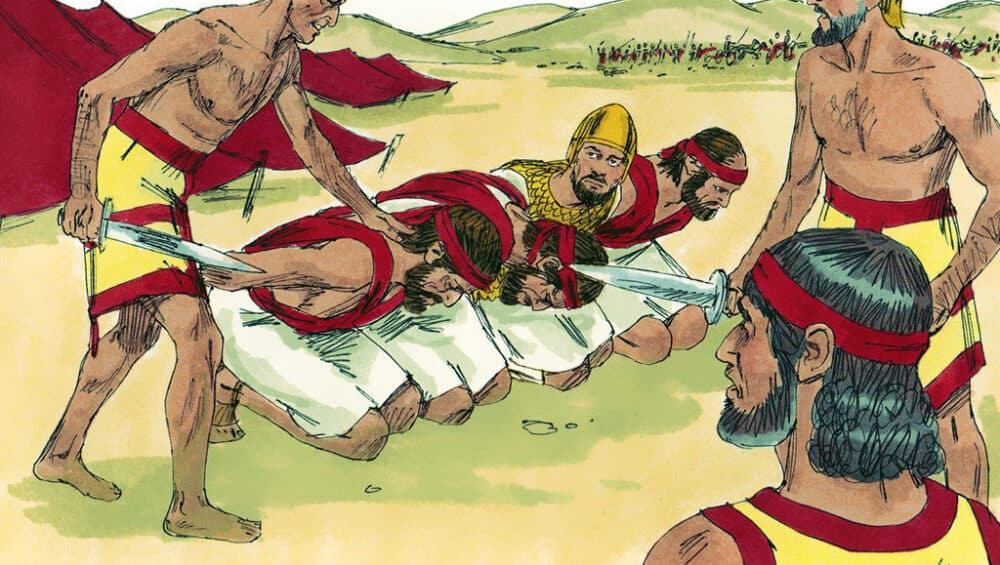Sweet Publishing / FreeBibleimages.org
Welcome to Livin’ Light’s Bible-In-A-Year challenge of discovering God’s love for us and His purpose for our lives. Here is the format for this great adventure: The daily reading assignment is posted at 5 a.m. After each day’s reading, Leigh An Coplin, the blog host, shares observations and poses questions about difficult passages to Rob Fields, who studied Christian Education at Asbury Seminary and currently teaches Biology in the Orlando area. To start from the beginning, click on 365 Bible Readings and scroll down to Day 1. The reading schedule is taken from The One Year Chronological Bible NLT.
Today’s Reading
— 1 Samuel 30
— 1 Chronicles 12:20-22
— 1 Samuel 31
— 1 Chronicles 10
— 1 Chronicles 9:40-44
— 2 Samuel 4:4
— 2 Samuel 1
(1010-1002 BC) Click here for a timeline of the entire Bible.
Questions & Observations
Q. (1 Samuel 30:1,7): I am surprised that David and his men had left their town without protection. The area is full of war, volatility and uncertainty. Why would they leave their town unprotected? I do understand that David had to leave or Saul would have captured him.
A. Most likely because the king David was “working for” compelled him to take all of his men into battle. I’m not saying it was a wise decision, just most likely the reason.
Q. (30:7) What ephod are we talking about here? Is it the one way back from Moses’ days?
A. Yep. That’s the one. It is actually part of the reason Saul couldn’t consult God, because after he killed the priests, the one remaining priest escaped with the ephod. Just one more way that God favored David over Saul in the midst of this story.
Q. (30:21-25): Giving handouts to those who don’t bother working is always something I have had trouble with. I don’t believe in the welfare program because of the stories like comedian Adam Carolla tells where his mom didn’t get a job so she could keep getting food stamps. I do believe in helping those in need, but not sure if that should be a government function or just a service of churches and charities. In this story, 200 men were fatigued. We don’t know if that means they really were or just whining. Regardless, what does the Bible say about giving to everyone, including those who live off the “system”? Here, I do see that David recognized the victory and wanted to give the glory to God. By following the suggestions of the sour-grape soldiers, he would have put a blemish on the celebration, and thus disrespected God.
A. We’re blurring some lines when we consider government assistance in a modern sense to making provision for soldiers who lived thousands of years ago. I wouldn’t draw too many conclusions from this story and our modern welfare system. In fact, one of the problems we run into as Christians is when we attempt to pigeonhole biblical concepts in a modern setting. It just doesn’t work, and makes us look petty or foolish. Be careful about that! Now having said that, there’s two things I think the Bible has to say about laziness (we will see this described in Proverbs). First, DON’T BE LAZY! Second, be generous to all who have need — and don’t make consideration of motive, like someone mooching off of you. When those two things are put together, you have yourself and your neighbor pretty much taken care of.
O. (1 Chronicles 12:20-22): This David-and-Saul story is a quite unusual. Here you have Israel, God’s chosen people, led by King Saul, who was anointed but fell from God’s grace, yet still rules over his people. Then, you have David, also anointed and in God’s favor, who now leads soldiers, referred to in verse 22 as “the army of God.”
Q. (1 Samuel 31:6): So, David promised to not kill Saul’s family (1 Samuel 24:21-22), a promise that he easily kept as we see here. However, I am sad that Jonathan was killed.
A. Saul’s poor decisions got his heir (Jonathan) killed and his family line cut off. It is tragic all around.
Q. (1 Chronicles 10:13-14): These two verses say that Saul disobeyed God by consulting a medium. 1 Samuel 28:6 says that Saul did ask God, but because he didn’t answer, Saul consulted a medium.
A. That’s not so hard to reconcile: rather than seeking to, for example, make peace with David and get the ephod back so that he could seek God’s will via the priest, or continue asking God for direction — just because God didn’t answer for a period of time doesn’t mean God would NEVER answer him again — Saul takes the easy and forbidden road of seeking a medium. That would be my guess on how to reconcile these two versions.
Q. (2 Samuel 1:1-16): Rob, you’ve got this one. I’m not sure who’s right and who’s wrong here. David has feared Saul, but also loves and respects him. This dichotomy is hard to accept. David seems to empathize with Saul and honors him with full respect.
A. I don’t think that David ever lost respect for Saul, and he greatly mourned his passing, especially since, though corrupt, he was God’s anointed king of Israel (as David alludes to). David desired to make peace, but he would have been a fool to trust Saul very far. I think a lot of the problems the two of them had were because of the evil spirit that tormented Saul: it appears that the king was never the same after this spirit began to torment him.
Q. (2 Sam 1:19-27): This song sounds like David is putting shame on the Israelites.
A. It certainly does. David will begin working on turning that shame around in our next reading.
For further study: As Jonathan showed us, life is full of tough decisions, https://www.learnreligions.com/jonathan-in-the-bible-701186
Shop: Christian shirts get noticed. Check out these conversation starters: https://livinlight.org/shop/
Tomorrow’s reading
— 2 Samuel 2-3:5
— 1 Chronicles 3:1-4a
— 2 Samuel 23:8-17
— 1 Chronicles 11:10-19
— 2 Samuel 23:18-39
— 1 Chronicles 11:20-47











